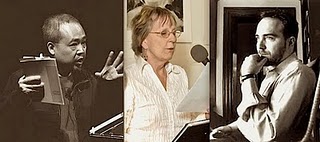Gwendolyn Brooks' poem "Truth" is an early poem - probably written in the late 1940s, perhaps 1949. She mentions this poem in the introduction she gave to Etheridge Knight before Knight's reading on February 26, 1986. The recording of that introduction is available on PennSound's Etheridge Knight page. Here is a copy of the text of Brooks' poem.
Our poem is Kit Robinson’s “Return on Word,” collected in Robinson’s 2002 book, The Crave, which was published by Lyn Hejinian and Travis Ortiz at Atelos Press.
Rae Armantrout was in from San Diego and joined Linh Dinh, Tom Devaney and host Al Filreis for our conversation this time. At turns the group interprets the poem as a satirization of the referentially super-confident language of marking; as a critique of Language poetry (an aesthetic gathering with which Robinson has long been identified); as an expression of skepticism about the monetization and militarization of American rhetoric. Linh wishes Robinson had pushed the poem’s anti-marketing tendencies a bit further. Rae, who is a fan of Mad Men and herself knows a thing or two about poetically torquing flattened idiomatic speech, admires the way “all we need is a few good words” plays upon military linguistic merchandizing. Tom is positively devastated by the notion that thought might take “a contract out on” words.
Finally, the group agreed that the poem is about words’ value, seen through the dystopia of their devaluation at the hands of economic sectors in which referential certainty is guaranteed to get carried away – in which a good (profitable) year is anticipated by, maybe even determined by, the right people in the room thinking up just the right dead language for the moment.
If we look in the direction
these words will have to do adding to the enormous burden of words
The entire concept is entirely too conceptual all we need is a few good words
Anybody can relate to to declare an identity no one can take away
But which ones a handful of interest several people in a room
For several hours couldn’t come up with the point is to decide
Then move as one up and down in an altered state
This is easier said than done we are getting close, very close we are getting better
We are going to have a great year there is going to be hell to pay it’s gonna be a fuckin bloodbath
Then the return to words thought has taken a contract out on in order to move them around
Over the past year, this page has been the most oft-visited page here. Steven's dream of 6 million Oskar statuettes glittering in the sky above Cracow (to borrow an critical image put forward by Spielberg antagonist Art Spiegelman).
Gwendolyn Brooks
Truth and the Sun
Gwendolyn Brooks' poem "Truth" is an early poem - probably written in the late 1940s, perhaps 1949. She mentions this poem in the introduction she gave to Etheridge Knight before Knight's reading on February 26, 1986. The recording of that introduction is available on PennSound's Etheridge Knight page. Here is a copy of the text of Brooks' poem.
A few good words (PoemTalk #29)
Kit Robinson, "Return on Word"
LISTEN TO THE SHOW
Our poem is Kit Robinson’s “Return on Word,” collected in Robinson’s 2002 book, The Crave, which was published by Lyn Hejinian and Travis Ortiz at Atelos Press.
 Finally, the group agreed that the poem is about words’ value, seen through the dystopia of their devaluation at the hands of economic sectors in which referential certainty is guaranteed to get carried away – in which a good (profitable) year is anticipated by, maybe even determined by, the right people in the room thinking up just the right dead language for the moment.
Finally, the group agreed that the poem is about words’ value, seen through the dystopia of their devaluation at the hands of economic sectors in which referential certainty is guaranteed to get carried away – in which a good (profitable) year is anticipated by, maybe even determined by, the right people in the room thinking up just the right dead language for the moment.
Rae Armantrout was in from San Diego and joined Linh Dinh, Tom Devaney and host Al Filreis for our conversation this time. At turns the group interprets the poem as a satirization of the referentially super-confident language of marking; as a critique of Language poetry (an aesthetic gathering with which Robinson has long been identified); as an expression of skepticism about the monetization and militarization of American rhetoric. Linh wishes Robinson had pushed the poem’s anti-marketing tendencies a bit further. Rae, who is a fan of Mad Men and herself knows a thing or two about poetically torquing flattened idiomatic speech, admires the way “all we need is a few good words” plays upon military linguistic merchandizing. Tom is positively devastated by the notion that thought might take “a contract out on” words.
If we look in the direction
adding to the enormous burden of words
The entire concept
is entirely too conceptual
all we need is a few good words
Anybody can relate to
to declare an identity
no one can take away
But which ones
a handful of interest
several people in a room
For several hours
couldn’t come up with
the point is to decide
Then move as one
up and down
in an altered state
This is easier said than done
we are getting close, very close
we are getting better
We are going to have a great year
there is going to be hell to pay
it’s gonna be a fuckin bloodbath
Then the return to words
thought has taken a contract out on
in order to move them around
Nate Chinen: jazz and lunch
Spielberg endures